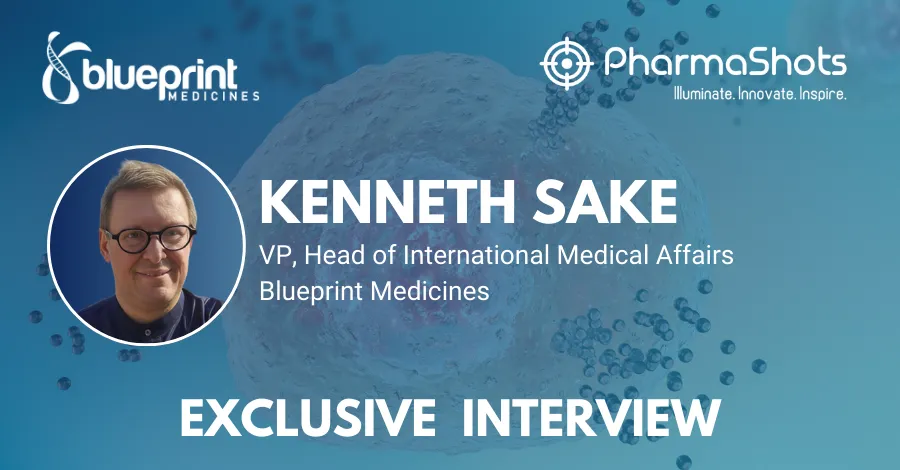
Insights from Coralie Gressier-Sayag on Avapritinib Efficacy Data Presented at EHA 2023
Shots:
- Coralie started by giving a brief introduction about Systemic Mastocytosis (SM), a rare disease. She told us that in Europe, approximately 40,000 people live with SM, with 80-90% living with Indolent SM and the rest with Advanced SM
- She then gave an overview of the P-II PATHFINDER study evaluating avapritinib. The study's 2-year follow-up data validates avapritinib's role in treating Advanced SM, providing long-lasting benefits and robust responses
- The interview shows how Blueprint Medicines remains committed to research and development, as well as educational initiatives for patients and healthcare providers, underlining their dedication to transforming care for rare diseases like SM
Smriti: To begin with, please can you briefly tell us about Systemic Mastocytosis?
Coralie Gressier-Sayag: Systemic Mastocytosis (SM) is a rare disease that results from the uncontrolled activation and proliferation of mast cells across multiple organ systems including bone marrow, skin, gastrointestinal tract, liver, spleen and lymph nodes. As activated mast cells release histamine and numerous vasoactive cell mediators that promote allergic reactions – which can include life-threatening allergic reactions – inflammation and other immune responses, people living with SM often live in fear of attacks impacting daily activities.
In Europe, there are approximately 40,000 people living with SM. Of this population, it is estimated that a vast majority of people (80-90%) are living with Indolent SM, whereas the rest of patients are living with Advanced SM. In addition to debilitating symptoms, advanced SM is associated with extracutaneous organ damage due to mast cells proliferation and infiltration and decreased overall survival.
Smriti: Can we talk a little about KIT D816V mutation and the role of avapritinib in the treatment of Advanced SM?
“In approximately 95% of cases, SM is driven by the genomic mutation KIT D816V. Avapritinib is thought to bind to the KIT D816V mutation and selectively targets a central driver of the disease.”
Coralie Gressier-Sayag: AYVAKYT® (avapritinib) is an oral tyrosine kinase inhibitor (TKI) that selectively targets KIT receptors, which are found on the surface of mast cells. In approximately 95% of cases, SM is driven by the genomic mutation KIT D816V. Avapritinib is thought to bind to the KIT D816V mutation and selectively targets a central driver of the disease. Avapritinib is approved by the European Medicines Agency (EMA) for the treatment of adult patients with aggressive SM (ASM), SM with an associated hematological neoplasm (SM-AHN), and mast cell leukemia (MCL), after at least one systemic therapy. Click here the European Summary of Product Characteristics for avapritinib.
Smriti: Could you kindly elaborate on the trial design of the Phase II PATHFINDER study which evaluated avapritinib in patients with Advanced SM? Also, give us details as to how the follow-up data were collected.
Coralie Gressier-Sayag: PATHFINDER is an open-label, single arm Phase 2 study evaluating the efficacy and safety of avapritinib in patients with Advanced SM, including ASM, SM-AHN and MCL. PATHFINDER enrolled 107 adult patients, with 85 in the first cohort (designated evaluable following measurable organ damage), and 22 in the second cohort (designated with no measurable organ damage), across 33 centres in 11 countries.
Smriti: Walk us through the results from the Phase II PATHFINDER study. What do the results mean for the treatment of Advanced SM?
Coralie Gressier-Sayag: The two-year follow-up data from PATHFINDER was presented at the European Hematology Association (EHA) congress in June 2023[i] and showed people living with Advanced SM, regardless of prior therapy or disease subtype, continued to experience deep and durable responses and clinically meaningful benefit with avapritinib treatment. At 2 years, a 73% Overall Response Rate (ORR) was achieved along with 27% CR/CRh (complete remission with partial hematologic recovery). Also at 2 years, the Duration of Response (DOR) rate was 89%, Progression-free Survival (PFS) 76% and Overall Survival (OS) was 79%. Median DOR, PFS and OS were not yet reached.
Smriti: How has the 2-year follow-up data supported the therapeutic efficacy of avapritinib in the treatment of Advanced SM?
“We are further encouraged by the breadth of clinical responses seen across disease subtypes. These data further validate the broad potential of avapritinib to transform care.”
Coralie Gressier-Sayag: 2-year follow-up data from the PATHFINDER study reinforce the role of avapritinib in the treatment of Advanced SM. It’s encouraging to see robust and durable responses with DOR, PFS and OS not yet reached, indicating that patients continue to do well on treatment. We are further encouraged by the breadth of clinical responses seen across disease subtypes. These data further validate the broad potential of avapritinib to transform care.
Smriti: Could you elaborate on the additional data for avapritinib that was presented at EHA?
Coralie Gressier-Sayag: Alongside data from the PATHFINDER study in Advanced SM, we also presented data from the registrational double-blind placebo-controlled PIONEER study of avapritinib[ii] in patients with Indolent SM. Avapritinib achieved statistically significant and clinically meaningful reductions on measures of pathological mast cell burden, disease symptoms and maintained a favourable safety profile. To date, no therapies have shown disease modification of Indolent SM in a controlled trial and current therapies tend to treat the symptoms, not the disease. Currently avapritinib is only approved for use in Indolent SM in the US.
Smriti: Are there any other indications or life cycle management (LCM) activities being done to increase the life cycle of this product?
Coralie Gressier-Sayag: At Blueprint Medicines, we aim to stay one step ahead of disease by developing therapies to adapt to disease evolution and delivering these medicines where patients face unmet needs. We continue to invest in research and development of avapritinib through clinical trials, scientific collaborations and more.
Smriti: As SM is a rare hematologic disorder, are there any plans to provide patient support programs or other programs to spreading awareness among people living with the disease?
Coralie Gressier-Sayag: It is our top priority to help more people with a rare disease live longer, healthier lives. Blueprint Medicines continues to work with the rare disease community around the world to better understand unique needs – ranging from access to education – to help assess how we can continue providing and evolving our support to demonstrate this shared commitment. At the end of 2022, we launched DiscoverSM to foster further education within the HCP community and we are currently assessing unique ways to grow awareness of SM within the rare disease patient community.
Smriti: Could you tell us more about any patient / HCP education and engagement programs being organized for avapritinib?
“Currently, we are sponsoring the PRISM study – the first SM study conducted to better understand the experience and perspectives of people living with SM and their healthcare providers.”
Coralie Gressier-Sayag: Blueprint Medicines supports various activities to raise awareness and education of SM. From a medical and scientific perspective, we develop medical education content and regularly contribute to key scientific meetings and symposia. Currently, we are sponsoring the PRISM study – the first SM study conducted to better understand the experience and perspectives of people living with SM and their healthcare providers. PRISM launched in 7 countries across Europe. We plan to present preliminary results before the end of 2023 and publish the full results in 2024.
In addition to PRISM, we support many localized advocacy projects to help raise awareness and increase education of SM. For example, in France we recently supported a local organization’s own version of the famous Tour de France where one SM advocate biked 3,000km through 15 cities to raise awareness of rare mast cell diseases. In addition to sponsoring his ride, members of our French team met him along his route in Paris to cheer him on!
About the Author:
Coralie Gressier-Sayag

Coralie Gressier-Sayag, PharmD is the Senior Medical Director, Medical Affairs International at Blueprint Medicines, based in Zug, Switzerland. Coralie spent then more than 6 years at Incyte Biosciences where she had increasing responsibilities in team management and product launch, most recently leading the launch of Pemazyre® (pemigatinib) across Europe before joining Blueprint Medicines last year. Coralie graduated from Paris René Descartes Pharmacy University and then worked at Cochin hospital in Paris in the Cytotoxic and Chemotherapy Preparation Unit before joining the pharmaceutical industry where she has fifteen years of experience especially in medical affairs project management, prelaunch and launch of new drugs in Onco-Hematology.
Tags

Senior Editor at PharmaShots. She is curious and very passionate about recent updates and developments in the life sciences industry. She covers Biopharma, MedTech, and Digital health segments along with different reports at PharmaShots.














